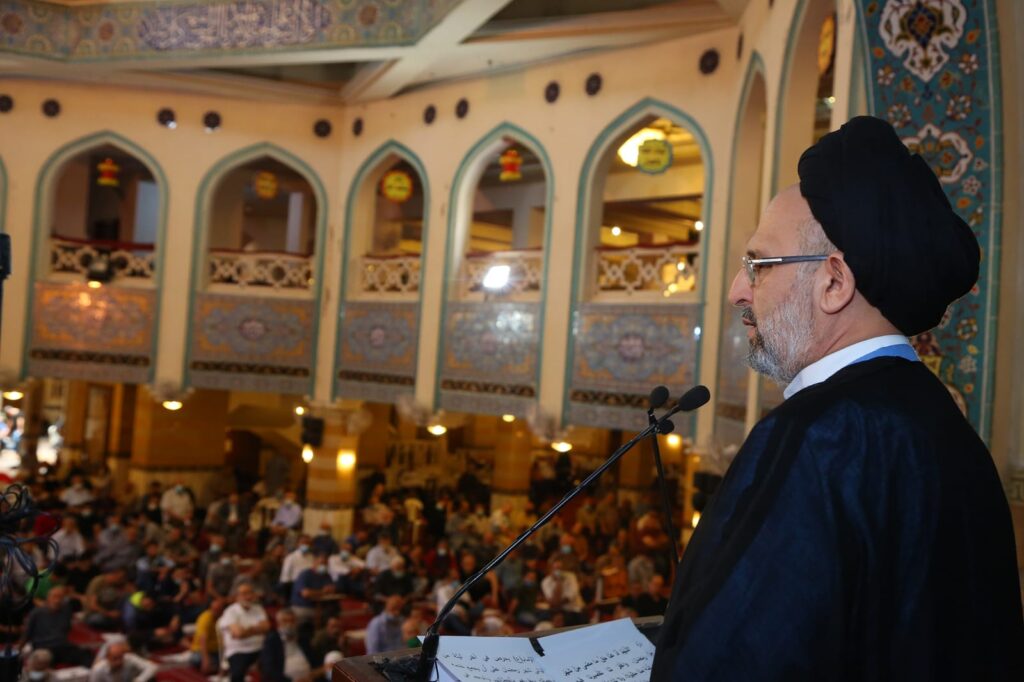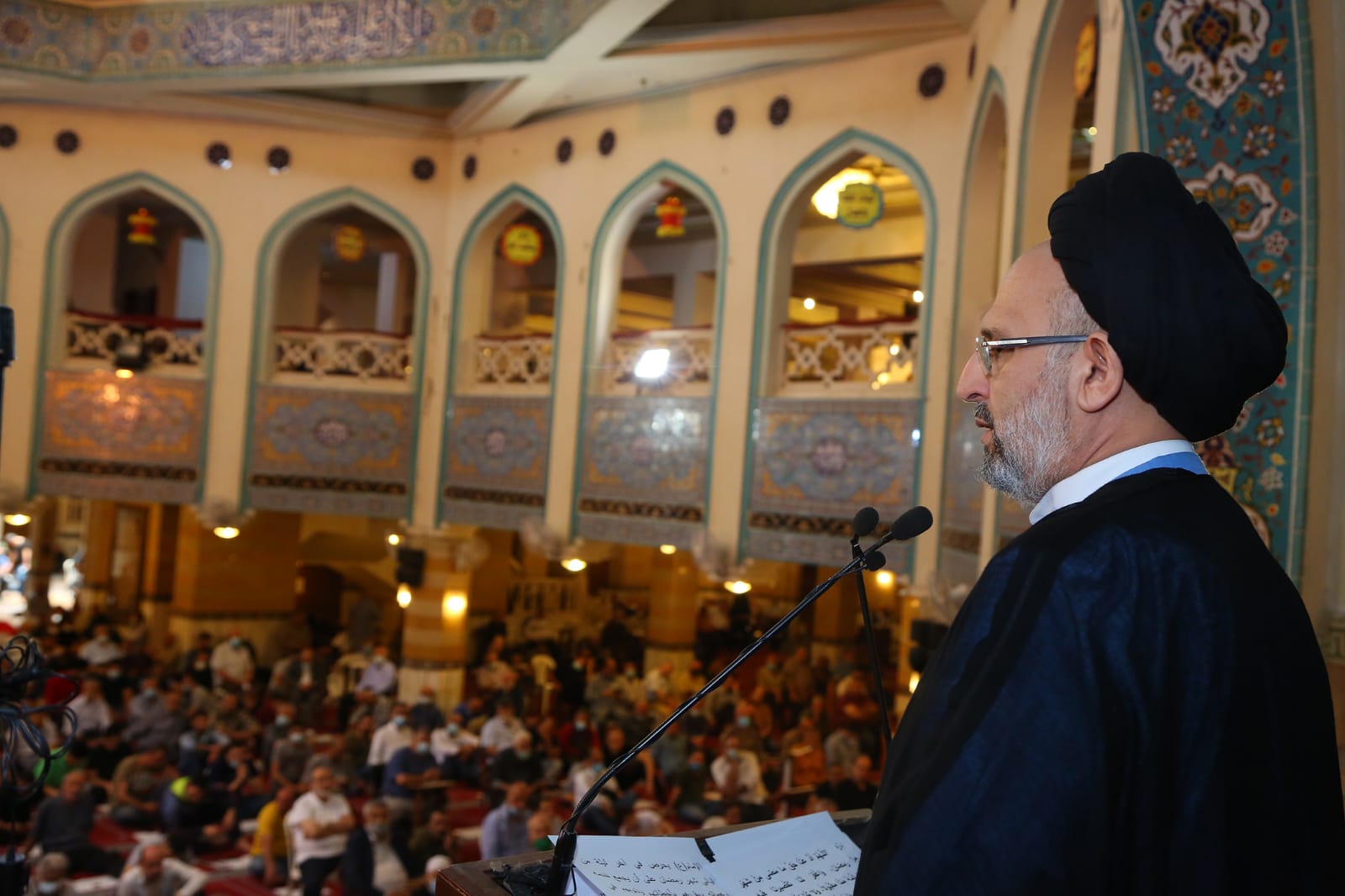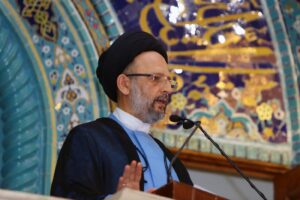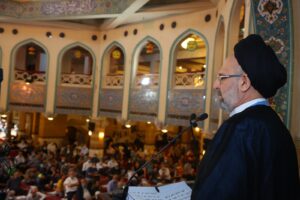In The Name of Allah, The Compassionate, The Merciful.
His Eminence, Sayyed Ali Fadlullah, delivered the two Friday prayer sermons at the Imamain Al-Hassanain Mosque, Rajab 22, 1445 /February 2, 2024. Several prominent religious scholars, dignitaries, and hundreds of believers attended the Jumu’a prayer. Following is a summary of the sermons.
The First Sermon
Allah, the Most Exalted, says in His Glorious Book”: “And We made them leaders guiding by Our command, and We inspired to them the doing of good deeds, establishment of prayer, and giving of zakah, and they were worshippers of Us . Allah, the Most Exalted, speaks the truth
On the twenty-fifth day of the holy month of Rajab, we recall the anniversary of the passing of the seventh Imam from the Ahl al-Bayt (a.s.), Imam Musa ibn Jaa’far al-Kazim. This Imam, known by the titles that distinguish his qualities and the position he reached with Allah and in the hearts of the people, was called the righteous servant, the patient, the trustworthy, the gate of needs to Allah, and his most prominent title, Al-Kazim, reflecting his suppression of anger and endurance in the face of adversity.
Imam al-Kazim (a.s.) took on the responsibility of leadership after the death of his father, Imam al-Sadiq (a.s.), at the age of twenty. He endured hardships throughout his thirty-five years of Imamate, particularly during the oppressive rule of the Abbasid rulers. His sufferings were intensified during the reign of Harun al-Rashid, spending time in various prisons for a period of 8 to 14 years as there are different accounts.
Harun al-Rashid feared the influence of Imam Al-Kazim (a.s.) due to his boldness in confronting his deviation. The people recognized the Imam’s significance to the extent that someone said to Harun al-Rashid, “I never thought there were two caliphs on the earth until I saw Musa ibn Ja’far.”
Despite the severity of these sufferings, they did not deter the Imam (a.s.) from fulfilling his role in guiding people to the path of Allah, the Most Exalted, and fighting all aspects of deviation. One of his notable contributions was highlighting the role of intellect in Islam, challenging those who perceived a conflict between reason and religion. He emphasized the importance of intellect, stating, “Allah has two proofs against people: a clear proof and a hidden proof. As for the clear proof, it is the messengers, prophets, and Imams. As for the hidden proof, it is the minds”…
Today, on this sad occasion, we reflect on some aspects of his life as narrated in his biography, seeking inspiration and guidance in our own lives.
The First Incident; what he said to one of his companions, Safwan al-Jamal, when he came to him one day. He said to him, “O Safwan! Everything about you is good except one thing.” Safwan asked, “What is it?” The Imam replied, “Your renting out your camels to Harun al-Rashid.” Safwan said: “I do not do this out of greediness and foolishness. I rent my camels to him because he goes to hajj. I do not serve and accompany him. Instead, I send my servants to him”. The Imam asked: “does he owe you anything?” Safwan replied: “yes”. The Imam asked: “do you want him to live as long as he can pay his debts to you?” Safwan replied: “yes”. Then the Imam said: “if a person wants them to live, then he is one of them, and a person who is one of them will go to Hell. Did not you hear God’s saying: And do not be inclined to the wrongdoers or you will be touched by the Fire.”…
In doing so, he indicated the impermissibility of assisting the oppressor, even if it were at the level of wishing for the prolongation of his life, even if that came at the expense of sustenance and livelihood.
The Second Incident; according to the narration mentioned by the renowned commentator, Al-Zamakhshari, Harun al-Rashid proposed a settlement to return the property of Fatimah al-Zahra (a.s.) [Fadak]to her from her father, the Messenger of Allah (p.). The Imam accepted but set its borders. When Harun asked about them, the Imam said, “The first border is Aden (Yemen), the second is Samarkand (located in East Asia), the third is Africa, and the fourth is the edge of the sea beyond Khazar and Armenia.” These borders matched the extent of the Abbasid Caliphate. Harun, realized that he would lose everything, and told the Imam angrily to come and sit in his place. Responding the Imam said ” I will remain silent when justice is restored by its rightful owners, as we, the Ahl al-Bayt, are more deserving.”
The third Incident; occurred when Harun al-Rashid sent his minister, Yahya ibn Khalid al-Barmaki, to the Imam after a long period of imprisonment, offering to release him if he apologized. The Imam refused, stating that he had nothing to apologize for, and it was Harun who should apologize to him. He sent a message to Harun: “O Harun, the deadline is near, and the reckoning is with Allah.
The Imam praised Allah for being imprisoned and thus was granted the opportunity to9 dedicate his time for worship. The imprisonment is dearer to him than a humiliating freedom, where he would be silent in the face of the oppressors’ injustice, refrain from speaking the truth, supporting the oppressed, exposing deviation, or refusing to legitimize them…
In this way, the Imam chose imprisonment because he made Harun desperate, leading him to resort to poisoning the Imam while he was in prison, choosing to die as a martyr and serve as an example for those enduring patiently for a cause.
Dear loved ones, this is Imam al-Kazim (a.s.), and these are his stances that we should always recall in the face of oppression, corruption, and deviation. We should not accept them, and we must have the strength and courage to stand against every oppressor, corrupt, and deviant, even if it costs us not fearing the blame of anyone in the path of Allah. We should endure when situations lead us to suffer, seeing it as our happiness, as we support truth and justice, reaching a great position in this worldly life and with Allah, the Most Exalted, Who has promised the patient, saying, “Indeed, the patient will be given their reward without account.”
Only through such perseverance can we deserve to be among his followers, Shia, and supporters.
The second sermon
O worshippers of Allah, I advise you and myself with the advice of Imam Al-Kazim (a.s.) to one of his companions when he said: “Convey good, speak good, and do not be with the people a yes man.” Asked, “What is a yes man?” He said, “Do not say, ‘I am with the people,’ and I am like any of the people… Indeed, the Messenger of Allah, (p.), said: ‘O people, they are only two kinds: a group that promotes good, and a group that promotes evil. So, do not let the promotion of evil be dearer to you than the promotion of good.'”
We are in great need of this advice, which calls us not to let our positions and choices in life be mere reflections of the people around us. Instead, we should not stand where they stand and move where they move, supporting those they support and opposing those they oppose. Rather, the right should be a reflection of our faith and values, guiding us towards justice and righteousness, even if we find ourselves alone in that stance while everyone else follows falsehood, corruption, and injustice. If we do this, we will be secure when standing before Allah, where every soul is accountable for itself, being more aware and responsible for our steps and capable of facing challenges.
The starting point is Palestine, where the suffering of the Palestinian people continues. In Gaza, the Zionist enemy persists in committing massacres against civilians and systematic destruction, imposing a blockade that threatens the lives and necessities of its inhabitants. Meanwhile, daily incursions occur in the West Bank, resulting in more martyrs and wounded, reaching the point of invading hospitals and killing patients.
It has become clear that the Zionist entity aims to eliminate the Palestinian cause by displacing the people from their land, or subjecting them to its complete control and depriving them of their identity.
The enemy is encouraged by the support it receives, not only militarily, financially, and intelligence-wise and securing sufficient international cover, but also by cutting the lifeblood for this people is represented by suspending the services of UNRWA, the organization that assists the Palestinian people in various aspects of life.
In this context, questions arise about the stance of Arab and Islamic countries facing this plan, which, if successful, would displace an Arab and Islamic people and contribute to the downfall of their cause.
If this cause falls, all the causes of the Arab and Islamic nation and its fate will be at the mercy of this enemy.
Despite all the wounds and pains that the Palestinian people endure from this entity and its supporters, and those who remain silent about its crimes, they continue to confront it despite the limited resources and support. They demonstrate, in the process, heroic acts of bravery and sacrifice, even facing the advanced military machinery of the enemy and pursuing it in all the places it advances to. At this time, we witness initiatives seeking to stop the bloodshed and put an end to the war. We hope that these efforts succeed, taking into consideration the right of the Palestinian people to security, freedom, dignified living, and steadfastness in their land. We are confident that this people will not offer a free victory to the enemy and will not allow it to escape the dilemma it is in at the expense of their freedom, dignity, security, and the immense sacrifices they have made.
Turning to Lebanon, its resistance continues in its chosen path, supporting the Palestinian cause. It offers significant sacrifices in this regard, driven by a sense of responsibility in supporting the Palestinian people and a belief that this choice is a deterrent element to this enemy from any adventure it may undertake against this homeland. This choice the enemy made has not stopped throughout its entire history revealing its aggressive intentions and intense hostility towards this country. Unfortunately, there are those who still consider this enemy as an innocent lamb.
Meanwhile, the Zionist enemy continues its attacks on Lebanese villages and it threatens, as stated by its Minister of War, that its army “will move very soon on the northern border with Lebanon,” along with successive international pressure messages, coming in the form of advice, to persuade the resistance to abandon this choice.
We see that these threats are nothing more than exaggeration and psychological warfare practiced by the enemy, as it has become clear that the Zionist entity is unable to launch a broad aggression on Lebanon after the exhaustion suffered by its army and its realization of the capabilities possessed by the resistance. The war with it will not be a walk in the park, especially with the absence of international green light. Nevertheless, we emphasize the need for caution regarding the developments in the entire region. We must remain in Lebanon ready for the repercussions of what is happening, and internal unity should be the basis from which we confront all upcoming challenges, as we fear that internal divisions and some positions and reactions might tempt the enemy to expand the circle of its aggression or encourage it to go further in its adventures.
Therefore, we renew our call to religious, political, social, cultural, and media leaders to carefully control their discourse or reactions, avoiding tension or internal division at a time when unity is most needed to face internal and external challenges. We specifically address religious leaders, who bear a great responsibility in building bridges between the Lebanese, focusing on national commonalities, and strengthening internal unity. Their fundamental role lies in being the guards of moral, humanitarian, and national values. If this role is shaken, the pillars of the nation shake, and the gap between its components widens, which no one wants at all…
Finally, what we expected happened with the approval of the budget, laden with taxes and fees that detail an increase in the impoverishment and suffering of the Lebanese, who are unable to bear the current burdens.
We fear that the increasing pressure on people and the failure to provide them with their due rights at the salary level to meet their needs may push the country towards social chaos, warned by everyone…





